#ZiChrono
Text
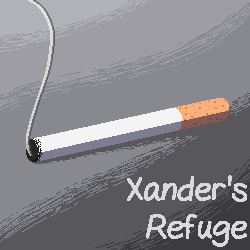
Do you want to hang out with a tired old man in a cave? Of course you do!!!
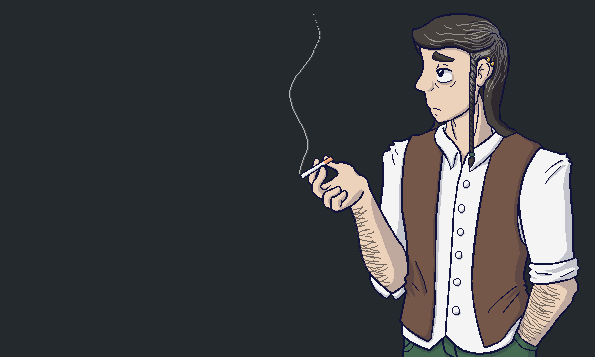
Made during the month of August, Xander's Refuge is a ghost made with the prompt "a ghost of an ancient deity that always seems tired, and is looking for a safe place to hide". He's a very straightforward ghost, but he has about 100 random dialogues to entertain you.
Besides this, he also makes for a good idle companion! Even between dialogues, he will sometimes change poses so that he's not sitting still all the time. This includes an idle smoking animation! He'll do this even if you turn his dialogues completely off.
And that's it, that's the ghost! As I said, extremely straightforward. But, I hope you will enjoy him nonetheless! There is a fair bit of content here, and my main focus was keeping the scope super small so I could make it all as polished as possible.
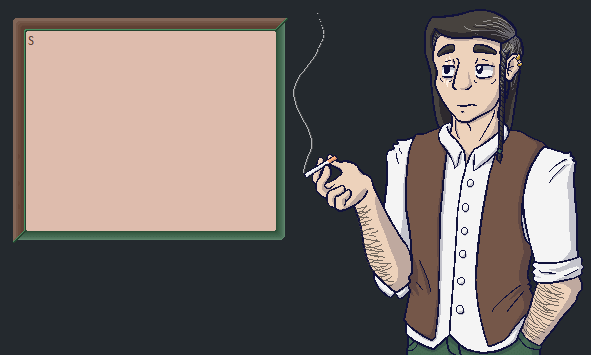
Download him from my website here!
(By the way, I overhauled my website and moved URLs! It's not totally finished yet, but you should browse around the indexes. I have many ghosts and related things available!)
Don't know what a ghost is / how to install this? Read up here!
Also, if you want to read more about this particular ghost and how he works, check out his page on the Ukagaka Dream Team Wiki!
#Ukagaka#English ukagaka#Xander's Refuge#Ukagaka ghost#ZiArt#ZiUkagaka#ZiChrono#Aughost#Aughost 2023
120 notes
·
View notes
Text
A brief explanation of Jewish mourning ceremonies due to the recent AJR news about their dad
I'm a relatively new AJR fan, but since they are culturally Jewish, and I'm a lifetime Jew, here is a brief do-and-don't about Jewish mourning traditions:
blessings. as you probably saw, Jews don't really say "Rest in Peace" we say "יהי זכרם ברוך" (yehi zechram baroch) which translate to "may their memory be a blessing" (or "may their memory be blessed" both work, usually use the first one). There are other blessings that exists, but they are more of an inner-Jewish thing. No one will get really mad if you "rest in peace" but using "may his memory be a blessing" is far more appropriate.
the Shiva- a seven day mourning period that starts right after the burial. there are various of customs and traditions that exist, and each family has their own. The Important part for the Fandom is that the Shiva includes not only mourning the dead, but also sharing stories from their lives, which is highly encouraged. There are those in the fandom who are working on collecting letters and art: @/letters.to.gary2023 and @/ajr_flamingo on Instagram started collecting, so if you have something you would like to send, they are a good place to start.
there are various mourning customs and traditions, and without personally knowing the level of observance, I cannot tell you what they will go with, but I ask to let them the time and space to mourn in their own time.
hopes this helps.
Sending
33 notes
·
View notes
Text
Hey check out this autobiographical comic my aunt Pat did about my grandfather's last year alive with special guest actual-factual Elisabeth Kübler-Ross; it's really good*
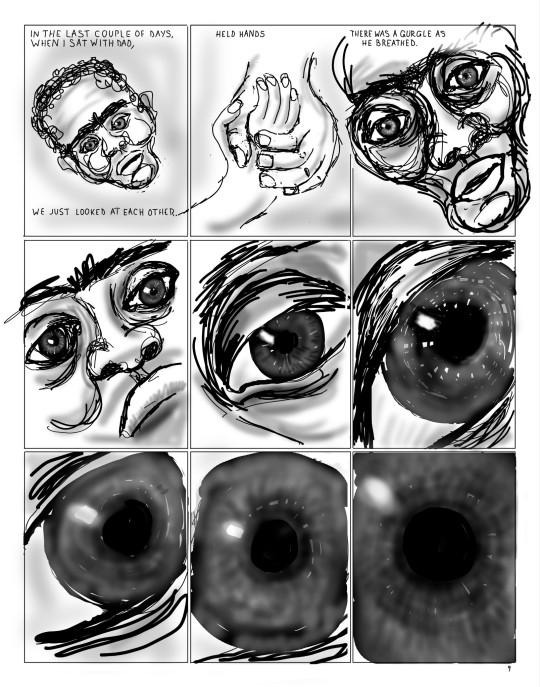
*I'm biased on account of it's one of my only connections to a guy who died 19 years before I was born and also I really like Pat BUT ALSO it just IS a good piece about family and friends and the process of dying from pancreatic cancer
4 notes
·
View notes
Note
Hi would it be okay if i asked you why you detest richard dawkins?? Cause i also hate him to pieces and would like to share some indulgent hatered of this fucking old ass shit man. Please go off
I mean, to go FULLY into it would require me to write an entire essay, and I just don't want to?
But the short version is
antitheism is cultural genocide and patently bullshit
focusing on genes rather than the whole organism in evolution is patently ridiculous when the minimum unit of evolution is the *population*, not the gene
in fact, when you realize the minimum unit is the population rather than the gene, you see that altruism and social behavior are very beneficial, even across species (see: symbiosis), and "selfishness" "red in tooth and claw" "law of the jungle" are just bullshit things some people made up to justify their crappy behavior (re: racism. their crappy behavior was racism.)
IQ and intelligence are smoke and mirrors we invented to convince ourselves we're more evolved than other animals (we're not, and every organisms has the intelligence it needs for its environment, adapted for its ecology, and that means that a diversity of intelligences is actually a good thing like diversity of anything is a good thing)
the man is a eugenecist and that speaks for itself
I hate him, and I hate that we live in a world where he is still alive and Stephen Jay Gould is dead, zichrono livracha
2K notes
·
View notes
Text
As I watched people online debate the models of anti-colonial struggle, raising comparisons to Algeria and North America and South Africa, I found myself returning to the foundational Jewish liberation myth: the Exodus. It was hard not to think about the moment in the Passover seder when we lessen the wine in our full cups with our pinkies as we recite the plagues. This ritual has materialized as an indispensable touchstone, insisting that to hold onto our humanity we must grieve all violence, even against the oppressor.
But I also thought of the plagues themselves, particularly the final one, the slaying of the first born—children, adults, the elderly. It seems that hiding in our liberation myth is a recognition that violence will visit the oppressor society indiscriminately. I know that I have many friends, and that Currents has many readers, who are asking themselves how they can be part of a left that seems to treat Israeli deaths as a necessary, if not desirable, part of Palestinian liberation. But what Exodus reminds us is that the dehumanization that is required to oppress and occupy another people always dehumanizes the oppressor in turn. For people who feel like their pain is being devalued, it’s because it is; and that devaluation is itself a hallmark of the cycle of the diminishing value of human life. As the abolitionist geographer Ruth Wilson Gilmore has said, “Where life is precious, life is precious.” We are seeing the ways that Jews as the agents of apartheid will not be spared—even those of us who have devoted our lives to the work of ending it. (I am thinking of Hayim Katsman, zichrono l’vracha, killed by Hamas, an activist against the expulsion of the West Bank community of Masafer Yatta, and Vivian Silver, a hostage in Gaza, who is known to many of its residents as the person they meet at the Erez Crossing who advocates for and facilitates their transfers to Israeli hospitals for treatment.)
[...]
On the left, I hope we do not mistake the inevitability of the violence for an inescapable limit on our work or the quality of our thought. Even if our dreams for better have failed, they must accompany us through this moment to the other side.
663 notes
·
View notes
Text
As I watched people online debate the models of anti-colonial struggle, raising comparisons to Algeria and North America and South Africa, I found myself returning to the foundational Jewish liberation myth: the Exodus. It was hard not to think about the moment in the Passover seder when we lessen the wine in our full cups with our pinkies as we recite the plagues. This ritual has materialized as an indispensable touchstone, insisting that to hold onto our humanity we must grieve all violence, even against the oppressor.
But I also thought of the plagues themselves, particularly the final one, the slaying of the first born—children, adults, the elderly. It seems that hiding in our liberation myth is a recognition that violence will visit the oppressor society indiscriminately. I know that I have many friends, and that Currents has many readers, who are asking themselves how they can be part of a left that seems to treat Israeli deaths as a necessary, if not desirable, part of Palestinian liberation. But what Exodus reminds us is that the dehumanization that is required to oppress and occupy another people always dehumanizes the oppressor in turn. For people who feel like their pain is being devalued, it’s because it is; and that devaluation is itself a hallmark of the cycle of the diminishing value of human life. As the abolitionist geographer Ruth Wilson Gilmore has said, “Where life is precious, life is precious.” We are seeing the ways that Jews as the agents of apartheid will not be spared—even those of us who have devoted our lives to the work of ending it. (I am thinking of Hayim Katsman, zichrono l’vracha, killed by Hamas, an activist against the expulsion of the West Bank community of Masafer Yatta, and Vivian Silver, a hostage in Gaza, who is known to many of its residents as the person they meet at the Erez Crossing who advocates for and facilitates their transfers to Israeli hospitals for treatment.)
That question of how we recuperate this humanity is ultimately an organizing question. People have repeated over and over again over the last few days that you “cannot tell Palestinians how to resist.” To me, it seems there is a very literal dimension to this axiom: They are not asking. Part of what has made the experience of this event feel so different from the status quo—and so different to Palestinians and Jews—comes from the fact that Palestinians were undeniably the actors, for once, not the acted upon. The protagonists of the story. I consider it an enormous failure of our movements that we have not been able to build a vehicle for that kind of reversal in any other way thus far. Our Jewish movements for Palestine were not powerful enough to stop other Jews from gunning down Palestinians in peaceful marches at the Gazan border fence, or to keep Palestinians from being fired, harassed, and sued for speaking the truth about their experience or—God forbid—advocating the nonviolent tactic of boycott. And now, we do not have a shared struggle able to credibly respond to these massacres of Israelis and Palestinians. With all of the work that many Jews and Palestinians have done to reach toward each other over the years, I believe at heart it is this failure that is now driving us apart. There is no formidable political formation that I know of that can hold the political subjectivity of both Jews and Palestinians in this moment without simply attempting to assimilate one into the other. No place where Jews and Palestinians who agree on the basics of Palestinian liberation—right of return, equality, and reparations—are poised to turn the synthesis of these two subjectivities into a coherent strategy.
One of the most terrible things about this event is the sense of its inevitability. The violence of apartheid and colonialism begets more violence. Many people have struggled with the straightjacket of this inevitability, straining to articulate that its recognition does not mean its embrace. I am reminding myself that it was from Palestinians, many of them writing and speaking in these pages, that I learned to think of Palestine as a site of possibility—a place where the very idea of the nation-state, which has so harmed both peoples, could be remade or destroyed entirely. And it was Palestinians who opened my thinking to multiple visions of sharing the land. On the left, I hope we do not mistake the inevitability of the violence for an inescapable limit on our work or the quality of our thought. Even if our dreams for better have failed, they must accompany us through this moment to the other side. We need to imagine a movement for liberation better even than the Exodus—an exodus where neither people has to leave. Where people stay to pick up the pieces, rearranging themselves not just as Jews or Palestinians but as antifascists and workers and artists. I want what Puerto Rican Jewish poet and activist Aurora Levins Morales describes in her poem “Red Sea”:
We cannot cross until we carry each other,
all of us refugees, all of us prophets.
No more taking turns on history’s wheel,
trying to collect old debts no-one can pay.
The sea will not open that way.
This time that country
is what we promise each other,
our rage pressed cheek to cheek
until tears flood the space between,
until there are no enemies left,
because this time no one will be left to drown
and all of us must be chosen.
This time it’s all of us or none.
Arielle Angel, “‘We Cannot Cross Until We Carry Each Other’,” Jewish Currents, October 12, 2023.
501 notes
·
View notes
Text
Most of our internal disagreements center on the correct container for our grief. Our staff is not unlike the rest of the Jewish world in that many of us are only a matter of degrees from someone who died or was taken hostage. How can we publicly grieve the death and suffering of Israelis without these feelings being politically metabolized against Palestinians? ... In this way, Jewish grief is routed back into the violence of a merciless system of Palestinian subjugation that reigns from the river to the sea. ...
... “I do not rejoice over death. I rejoice over the possibility to live,” [writer and reporter Hebh Jamal] writes, and as such “I cannot condemn the militants if I believe even for a second that there might be a possibility of all of this finally coming to an end.” Hebh describes the sense of possibility that many Palestinians have felt in these events, as they have disturbed—perhaps only momentarily, it remains to be seen—the dominant paradigm in which they are condemned to die waiting for their freedom, as so many other nonviolent avenues to liberation have been punished or ignored. Hebh’s reaction appears common to so many of the Palestinians I know and trust that I must try to feel my way into it.
... But what Exodus reminds us is that the dehumanization that is required to oppress and occupy another people always dehumanizes the oppressor in turn. For people who feel like their pain is being devalued, it’s because it is; and that devaluation is itself a hallmark of the cycle of the diminishing value of human life. As the abolitionist geographer Ruth Wilson Gilmore has said, “Where life is precious, life is precious.” We are seeing the ways that Jews as the agents of apartheid will not be spared—even those of us who have devoted our lives to the work of ending it. (I am thinking of Hayim Katsman, zichrono l’vracha, killed by Hamas, an activist against the expulsion of the West Bank community of Masafer Yatta, and Vivian Silver, a hostage in Gaza, who is known to many of its residents as the person they meet at the Erez Crossing who advocates for and facilitates their transfers to Israeli hospitals for treatment.) ...
One of the most terrible things about this event is the sense of its inevitability. The violence of apartheid and colonialism begets more violence. Many people have struggled with the straightjacket of this inevitability, straining to articulate that its recognition does not mean its embrace. I am reminding myself that it was from Palestinians, many of them writing and speaking in these pages, that I learned to think of Palestine as a site of possibility—a place where the very idea of the nation-state, which has so harmed both peoples, could be remade or destroyed entirely. And it was Palestinians who opened my thinking to multiple visions of sharing the land. On the left, I hope we do not mistake the inevitability of the violence for an inescapable limit on our work or the quality of our thought. Even if our dreams for better have failed, they must accompany us through this moment to the other side.
Full text:
This has been the hardest week we’ve ever had to weather as a staff at Jewish Currents. Events are moving so fast that there seems no hope of apprehending any of it fully, of saying the thing that will feel right for the moment which is already gone. With great effort, we finish a section of our explainer only for new information to surface and invalidate it. And it’s not just about the facts. Feelings and positions are in flux. There are political questions and fault lines that have been simmering under the surface in our organization—in the Jewish left, and I suspect the left generally—exploding to the fore, gumming up the works at a time when urgency feels paramount. Staff members are periodically bursting into tears, fighting with their families or with their friends, running on fitful sleep. A contributor’s son is a hostage. A contributor in Gaza texts: “Still alive. They are bombing everywhere. Nowhere is safe.”
Most of our internal disagreements center on the correct container for our grief. Our staff is not unlike the rest of the Jewish world in that many of us are only a matter of degrees from someone who died or was taken hostage. How can we publicly grieve the death and suffering of Israelis without these feelings being politically metabolized against Palestinians?
We have good reason to worry about this: As Israelis count their dead, politicians in Israel and the US call for Palestinian blood in direct, genocidal language. “We are fighting human animals and we will act accordingly,” said Israeli Defense Minister Yoav Gallant yesterday. “Finish them, Netanyahu,” said former Ambassador to the United Nations and Republican presidential candidate Nikki Haley. “Neutraliz[e] the terrorists,” said Democratic senator John Fetterman. Jews share memes about the highest number of Jewish casualties since the Holocaust, not bothering to ask who, right now, is being ethnically cleansed, or how many massacres of this size Gaza has seen in the last dozen years. This language deploys the bombs that fall on Gazans from the sky, leveling whole neighborhoods, wiping out families without warning, huddled in their homes because they have nowhere to flee. “There are body parts scattered everywhere. There are still people missing,” one man north of Gaza City told CNN. “We’re still looking for our brothers, our children. It’s like we’re stuck living in a nightmare.” We will likely soon see this genocidal impulse spread, as the Israeli government hands out automatic weapons to West Bank settlers, many of whom were already armed eliminationists. In this way, Jewish grief is routed back into the violence of a merciless system of Palestinian subjugation that reigns from the river to the sea. It is mobilized by US politicians who support Benjamin Netanyahu and his extremist government, which has intensified Palestinian death and displacement and disappeared any hope of a diplomatic solution. It is marshaled to drum up support for sending weapons to Israel, even as we know that, as Haggai Mattar wrote in +972 Magazine, “there is no military solution to Israel’s problem with Gaza, nor to the resistance that naturally emerges as a response to violent apartheid.”
We can’t let our grief be bent to these purposes, but it’s not clear where else to put it. Anyone who has been working in this space knows that our movements are not prepared to manage the emotional and political fallout. We watch as Jewish people and groups we thought we had pulled into our struggle, or at least begun to move politically, suddenly close ranks, profess support for the IDF, retreat into despair. Already complex and fragile relationships between Palestinian and left-wing Jewish activists—as well as factions within both of these groups—are being challenged as we struggle to derive the same meaning from the images coming across our screens. Friends and colleagues on all sides find themselves hurt by one another’s public reactions, or by their silence. A veteran anti-Zionist activist I spoke to wondered if a “chasm” was opening up between Palestinian and Jewish activists, especially as the current moment has made visible diaspora Jews’ tangible connections to that place and those people that are, inconveniently, not just the stuff of Israeli propaganda. Over the weekend, many avowed anti-Zionist Jews found they could not join solidarity protests because they needed something the protests could not provide: a space to grieve the Israeli dead, to struggle with their own place in the coming political process. It is a situation none of us have ever before confronted in earnest, amid a long history of vastly disproportionate death tolls. And now, when we need it most, we find ourselves struggling with a lack of emotional and political vocabulary.
On October 7th, my own feelings fluctuated wildly. My first feeling was fear. To listen closely to the genocidal language of this Israeli government over the past year has been to live in terror of the day they would find the excuse to pursue it. Writing in n+1, Jewish Currents contributing editor David Klion recounts the words of a campus activist in the wake of 9/11: “They’re already dead,” he’d said on the day Bush declared war on Iraqis, their fates sealed. I felt these words in my body, sobbing loudly in front of the screen. There were also bursts, very early on, of awe. I watched the image of the bulldozer destroying the Gaza fence again and again and cried tears of hope. I watched Palestinian teenagers seemingly out joyriding in a place half a mile away that they’d never been; a Gazan blogger suddenly reporting from Israel. But these images were quickly joined by others—the image of a woman’s body, mostly naked and bent unnaturally in the back of a truck; rooms full of families lying in piles, the walls spattered in blood. I wanted desperately to keep these images separate—to hold close the liberatory metaphor and banish the violent reality. By the time I began to accept that these were pictures of the same event, I was distraught, and contending with a rising alienation from those who did not seem to share my grief, especially as the scope of the massacre came into view.
“I have anti-Zionist Jewish friends who are rightfully scared,” writer and reporter Hebh Jamal wrote in a recent Mondoweiss article. She observes how, despite all their sympathy for Palestinian suffering, this may be the first moment such allies are tasting the fear—and the state of mourning—that has been real for Palestinians for decades. She has also lost someone this week—a cousin, 20 years old. “I do not rejoice over death. I rejoice over the possibility to live,” she writes, and as such “I cannot condemn the militants if I believe even for a second that there might be a possibility of all of this finally coming to an end.” Hebh describes the sense of possibility that many Palestinians have felt in these events, as they have disturbed—perhaps only momentarily, it remains to be seen—the dominant paradigm in which they are condemned to die waiting for their freedom, as so many other nonviolent avenues to liberation have been punished or ignored. Hebh’s reaction appears common to so many of the Palestinians I know and trust that I must try to feel my way into it.
As I watched people online debate the models of anti-colonial struggle, raising comparisons to Algeria and North America and South Africa, I found myself returning to the foundational Jewish liberation myth: the Exodus. It was hard not to think about the moment in the Passover seder when we lessen the wine in our full cups with our pinkies as we recite the plagues. This ritual has materialized as an indispensable touchstone, insisting that to hold onto our humanity we must grieve all violence, even against the oppressor.
But I also thought of the plagues themselves, particularly the final one, the slaying of the first born—children, adults, the elderly. It seems that hiding in our liberation myth is a recognition that violence will visit the oppressor society indiscriminately. I know that I have many friends, and that Currents has many readers, who are asking themselves how they can be part of a left that seems to treat Israeli deaths as a necessary, if not desirable, part of Palestinian liberation. But what Exodus reminds us is that the dehumanization that is required to oppress and occupy another people always dehumanizes the oppressor in turn. For people who feel like their pain is being devalued, it’s because it is; and that devaluation is itself a hallmark of the cycle of the diminishing value of human life. As the abolitionist geographer Ruth Wilson Gilmore has said, “Where life is precious, life is precious.” We are seeing the ways that Jews as the agents of apartheid will not be spared—even those of us who have devoted our lives to the work of ending it. (I am thinking of Hayim Katsman, zichrono l’vracha, killed by Hamas, an activist against the expulsion of the West Bank community of Masafer Yatta, and Vivian Silver, a hostage in Gaza, who is known to many of its residents as the person they meet at the Erez Crossing who advocates for and facilitates their transfers to Israeli hospitals for treatment.)
That question of how we recuperate this humanity is ultimately an organizing question. People have repeated over and over again over the last few days that you “cannot tell Palestinians how to resist.” To me, it seems there is a very literal dimension to this axiom: They are not asking. Part of what has made the experience of this event feel so different from the status quo—and so different to Palestinians and Jews—comes from the fact that Palestinians were undeniably the actors, for once, not the acted upon. The protagonists of the story. I consider it an enormous failure of our movements that we have not been able to build a vehicle for that kind of reversal in any other way thus far. Our Jewish movements for Palestine were not powerful enough to stop other Jews from gunning down Palestinians in peaceful marches at the Gazan border fence, or to keep Palestinians from being fired, harassed, and sued for speaking the truth about their experience or—God forbid—advocating the nonviolent tactic of boycott. And now, we do not have a shared struggle able to credibly respond to these massacres of Israelis and Palestinians. With all of the work that many Jews and Palestinians have done to reach toward each other over the years, I believe at heart it is this failure that is now driving us apart. There is no formidable political formation that I know of that can hold the political subjectivity of both Jews and Palestinians in this moment without simply attempting to assimilate one into the other. No place where Jews and Palestinians who agree on the basics of Palestinian liberation—right of return, equality, and reparations—are poised to turn the synthesis of these two subjectivities into a coherent strategy.
One of the most terrible things about this event is the sense of its inevitability. The violence of apartheid and colonialism begets more violence. Many people have struggled with the straightjacket of this inevitability, straining to articulate that its recognition does not mean its embrace. I am reminding myself that it was from Palestinians, many of them writing and speaking in these pages, that I learned to think of Palestine as a site of possibility—a place where the very idea of the nation-state, which has so harmed both peoples, could be remade or destroyed entirely. And it was Palestinians who opened my thinking to multiple visions of sharing the land. On the left, I hope we do not mistake the inevitability of the violence for an inescapable limit on our work or the quality of our thought. Even if our dreams for better have failed, they must accompany us through this moment to the other side. We need to imagine a movement for liberation better even than the Exodus—an exodus where neither people has to leave. Where people stay to pick up the pieces, rearranging themselves not just as Jews or Palestinians but as antifascists and workers and artists. I want what Puerto Rican Jewish poet and activist Aurora Levins Morales describes in her poem “Red Sea”:
We cannot cross until we carry each other,
all of us refugees, all of us prophets.
No more taking turns on history’s wheel,
trying to collect old debts no-one can pay.
The sea will not open that way.
This time that country
is what we promise each other,
our rage pressed cheek to cheek
until tears flood the space between,
until there are no enemies left,
because this time no one will be left to drown
and all of us must be chosen.
This time it’s all of us or none.
2 notes
·
View notes
Text
is it weird to still spend lots of time going through one specific dead person's posts over and over because they said so many things that were incredibly important and influential and they started a movement that changed my life and did a ton of stuff individually that helped me individually instead of just being generally associated with things that generally helped me? even though that dead person only ever had a handful of direct one-on-one conversations with me?
is that creepy or somehow bad?
or is it okay because this person did want to help people like me? because that was their entire goal?
is it weird that i was interviewed about my participation in the movement this person started and spent most of the time talking about this specific person instead of the movement itself? is there something inappropriate about focusing on the individual who helped me rather than generalising the credit out to the rest of the movement, if this individual is the one who had the most measurable, material positive impact on my life?
anyway, zichrono livracha and happy would-be 26th birthday to the person who changed my life
7 notes
·
View notes
Text
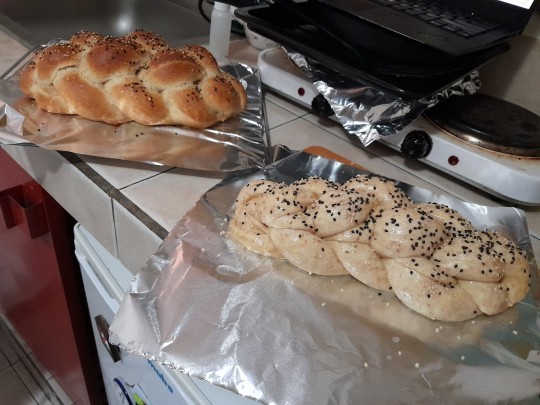
Shabbat shalom, y'all here I've cooked one challah for my friend in quarantine with coronavirus, and the other is now in the oven for my own shabbat dinner. Sadly I had to have a friend bring me a shivah candle as we lost a real one today, zichrono livracha may his name and memory be a blessing.
It's been a wild week please hug the ones you love and appreciate what you have
4 notes
·
View notes
Text
BEHOLD, A NEW GHOST
A 6 WAY COLLABORATION, MADE IN JUST 4 HOURS USING A COLLABORATIVE TEXT EDITING SERVICE
IT HAS 600+ DIALOGUES AND 10 SHELLS

DOWNLOAD HERE, OR READ MORE HERE
COLLABORATORS:
Galla
SmokyCinnamonRoll
Softie
Teacup is Zdzisiu who is Teacup who is Zdzisiu who is Teacup
Zichqec
☘
EMBRACE CHAOS
#Ukagaka#Collab#Ukagaka Ghost#English Ukagaka#Literally just a mess why did you download this#//That's the name of the ghost#ZiUkagaka#ZiChrono
20 notes
·
View notes
Text
Remember the time fotz tried to convinced laurel nighteyes (zichrono livracha) was a dog
1 note
·
View note
Text
Multiverse Sans Phone Event Fix
This is not my ghost and I am not offering to do any development work for him. But on several occasions, folks have entered our Discord server looking for help with a bug in one of MVSans's phone events that completely prevents progression. So, I decided to make a little patch for him to make this easier.
This is what the intro to the bugged event looks like:
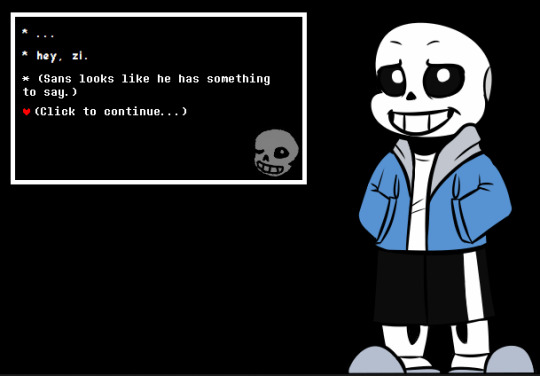
If you've seen this text and clicking the "Click to continue" option does not work, then this patch will fix it for you.
Download the patch here
To install the patch, follow these steps:
Download the file above, it should be called mv_sans_phone_fix.nar.
Open MVSans.
Check in his settings to ensure that you're on the latest version. This patch was made for v1.4.2 Stable, and may cause other versions to break. (If you're not on the latest version, update or download a new copy of the latest version.)
While MVSans is running, drag and drop the mv_sans_phone_fix.nar onto him. He should appear to be installing something.
When he is done installing, he should appear to reload. He will not say anything about completing the installation, that's normal. The ghost is now patched. (If he does say something, it's likely an error. If so, please report it to me and I can try to help.)
If you had already seen the intro to this bugged event, then please close and reopen the ghost. This should bring up the intro again, and you should be able to proceed.
If you have any problems with this supplement file, please do tell me about it! But it's a pretty small fix, so as long as you use it with the correct version of the ghost, it should be fine.
If you have any other problems with this ghost, you can send an ask to the @ukagakadreamteam blog, or ask in our Discord server. There is also a page for him on our wiki which has some general information about him.
My knowledge of this ghost is very limited, as I haven't used this version very much. So, other people who have used it may be able to help you more.
#Ukagaka#Supplement#Patch#Multiverse Sans#Multiverse Sans Ukagaka#English Ukagaka#ZiUkagaka#ZiChrono#//Should I be putting this here??? Idk#//I made the supplement I guess but all I really did was snip a tiny bit of code#//Shrug#//I want it to be findable for me later so#//Anyway hopefully this helps folks and we don't have to walk them through manually editing this part anymore#//I don't mind helping with it I just feel bad when I have to walk non-devs through the process#//And a little drag and drop fix is so much easier#//Supplement files are cool! Use them!#//It's like network updates without the network part#//I wouldn't want to use it in place of network updates but it's perfect for a case like this#Tag Ramble#//is that a tag i have? idk do i look like i actively use this blog anymore#Not art#//← tag relating to graphic art#//but i mean this really doesn't count either way i think lol - it's not a creative work from me it's just a tiny little patch
34 notes
·
View notes
Photo
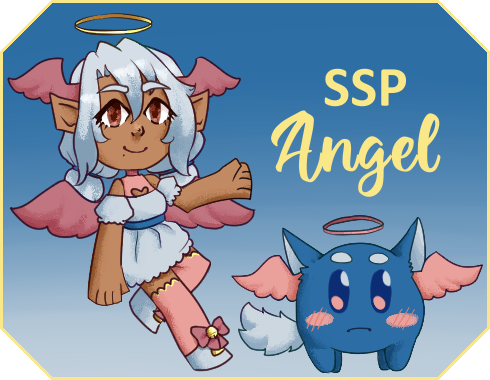



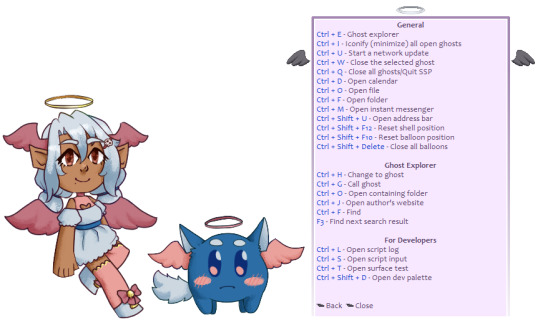
SSP Angel v1.0.0
SSP Angel is a ghost intended to serve as a guide to SSP and ghosts! They’ve got lots of tips for beginners to help get you (or someone you know) started with ukagaka. If you’re intrigued by this ukagaka thing but aren’t sure where to start, check them out! And even if you’re a long-time user, you might learn something new!
They have lots of things you can ask in their menus about how to work SSP, as well as a glossary, and a list of key combinations. They will also give you tips as part of their random dialogue. Though, if that’s not your cup of tea, fear not! You can toggle the random tips off, and they will function like a normal ghost. They have over 100 dialogues completely unrelated to SSP.
They also have some optional balloons you can download through their balloon settings menu, which have additional color options. You can pick and choose which color to use for which character!
This ghost was a collaborative effort, made possible through the efforts of @elderflowerprince, @thatoddhaystack, @gallathegalla, and myself. A lot of work went into this, and I can’t thank my collaborators enough for helping me see this through to completion!
Download them here, and check out their page on the Ukagaka Dream Team wiki, as well!
#Ukagaka#English Ukagaka#SSP Angel#Angel#Pilot#ZiUkagaka#ZiChrono#not art#release#//I'm really proud of these two but damn they were difficult#//Very high standards for them#//They've been in the works since like October!
122 notes
·
View notes
Text

ATM Machine v2.0.0
An update to a ghost that everyone here definitely knew about, because I definitely didn't just not post the original version to Tumblr!
Do you want to work for a bank and service their ATM? No? Well now with the power of ukagaka, you can! Work your boring day job and earn a small but steady flow of cash, while listening to annoying bank advertisements. Or maybe there's another way to earn funds more quickly...?
Changelog:
Added custom artwork for the shell. The original clipart is now available as a separate shell called Joypixels.
Added a custom balloon, called Unyu Bank Notes. If you already have ATM Machine installed, you will need to install the balloon separately from here.
The balloon's 6 color options can be changed between in ATM's menu.
Added 200 dialogues.
Added 2 minigames, which can be accessed after you "log in".
Migrated to the Simplicity Template. As such, the ghost now has responses to various SSP functions, the same as Simplicity.
Updated to YAYA Tc571-8.
Added crime.
You can download the ghost from my website, or read about it more on our wiki!
(Not sure what ukagaka are? Start here!)
It also comes with...
Unyu Bank Notes v1.0.0

A silly money and Unyu themed balloon with 6 color options in 5 sizes each.
Download the balloon here, or read more about it on our wiki.
That's all for now! Happy April Fools' Day, yes this is a real update/release.
#Ukagaka#English Ukagaka#Ukagaka Ghost#ATM Machine#ZiArt#ZiUkagaka#ZiChrono#//Yes there is more to this than meets the eye :)#//Will anyone find it I wonder#//I guess that depends on how my marketing skills are coming along#//Buy my ghost! It's free!!#//It's got 10 hours worth of random dialogue if you leave it at the default talkrate???#//It sure is... something 😂
15 notes
·
View notes
Text
SSP Angel v1.1.0
It's SSP Angel's release anniversary! 🥳 🎉
To celebrate, we've brought you an update with corrections to various information, additional glossary terms, a ton of new content, an optional floating animation for Angel, and more!
Some highlights from the changelog:
Added ~100 new non-tip dialogues, bringing the total to 200.
Updated some incorrect information and wording, in the tip dialogues and in the menus.
Corrected/updated glossary definitions: AYA, Dressup, Freeshell, Ghost/Ukagaka/Nanika, Interval, Kawari, MAKOTO, SHIORI, Sakura Script, Satori, Surface, Ukadoc.
New glossary definitions: Animation, Element, Middleware, Owner draw menu, and Supplement.
Added new questions to the "How do I" menu: Fast forwarding through text, Using the ghost explorer.
Added the ability to ask who they are in the question menu, to have them reintroduce themselves.
Added a new troubleshooting option related to installation trouble. This information was originally in the "How do I" menu and has been moved.
Added a dressup to Angel that allows her to float up and down.
Added a response for switching to the PH Gijinka shell, and responses to that shell's hat dressup.
See the full changelog on my website.
Get the update via network update, or download them from the link above if you don't have them yet!
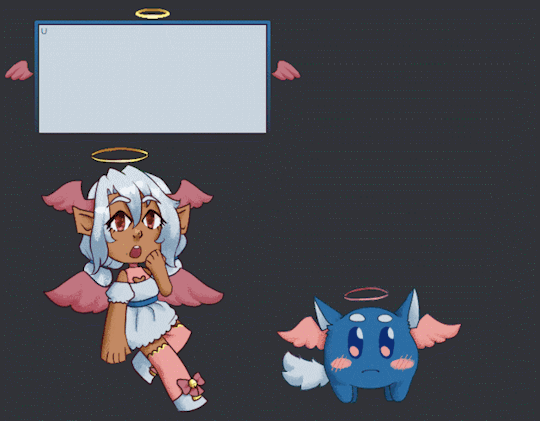
#Ukagaka#English Ukagaka#SSP Angel#Ukagaka Ghost#Update#Not art#//← referring to graphic art#ZiUkagaka#ZiChrono
15 notes
·
View notes